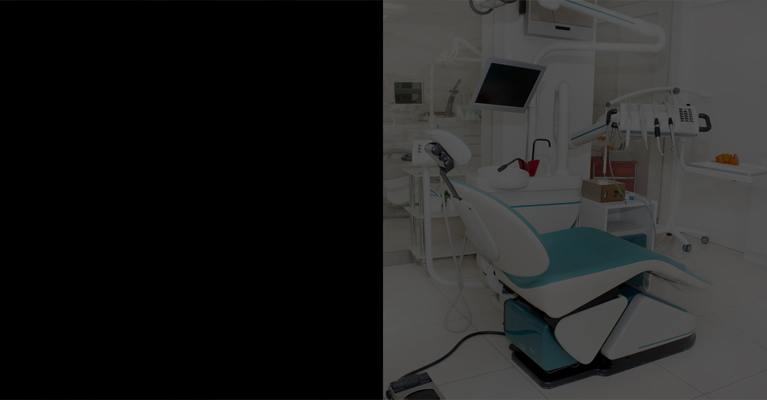















Dental Implants are titanium fixtures which are inserted into the jawbone. After successful healing these fixtures can then be used to support new crowns Bridges or Dentures.
Implants have been shown to have excellent survival rates and are well accepted by patients. Patients particularly like them as they are comfortable, stable and allow for easy chewing. They also reduce the rate at which the bone shrinks when we lose teeth.
The first part to implant treatment is the planning stage. It is vital that your mouth is healthy and there are no untreated dental problems such as decay, Root Canal work or Gum Disease. If any outstanding dental work is required Dr Kalsi will request that this is completed prior to further planning. We will take x-rays and 3D scans or your teeth and jaws to allow us to determine the top possible treatment. We will also take impressions or scans of your teeth, as well as records of how your teeth meet together when biting. A lab technician may construct a model known as a diagnostic wax-up, to demonstrate what the final implant-supported prosthesis will look like.
The next stage is for dental implants to be inserted. This is typically performed under local anaesthetic, though Sedation can be arranged at your request. The gum is gently lifted away from the underlying bone and the site is gently prepared using specialised drills. The implant is then placed into the jawbone and the gum is stitched over. Implants are normally placed at least 6-8 weeks following the removal of a tooth. In certain circumstances, we may choose to place the implant earlier than this or at the time of extraction. The stitches are usually removed 7-14 days following surgery. On occasion, bone and soft tissue (gum) grafting may be performed prior to or at the time of implant placement.
The implant is usually left in the jawbone for at least 3 months to allow for successful healing and integration with the surrounding jawbone. If the implant has been buried under the gum, a small secondary procedure is required to expose the implants before they can be used.
The final stage is the restorative phase. A number of appointments will be required construct your final implant prosthesis. These include impressions, the recording of your bite, checking the fit of components and the possible fit of a provisional prosthesis. In total the treatment time from the planning stage to the delivery of your final prosthesis could extend to over six months.
You will be advised to attend for reviews at regular intervals in the first 12-24 months following the placement of your dental implants. Implants have excellent survival rates and can function for a number of years. However, they can suffer from complications.
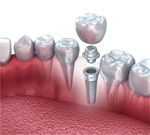
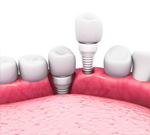
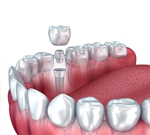
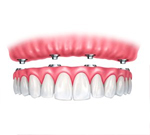
Most complications can be fixed relatively quickly. However, they still require an additional visit to the practice and according to costs. It is important you take the long-term costs of maintenance of your implants into consideration.
One of the more serious complications is known as implant gum disease or peri-implantitis. This condition involves the progressive loss of bone around your implants, as well as bleeding and infection of the overlying gums. It is not fully understood why implants suffer from gum disease, but a known history of existing or previous gum disease is a key risk factor. Treating implant gum disease is difficult and expensive. As such prevention is better than cure and regular appointments with a dental hygienist/ periodontist can reduce the risk of peri-implantitis dramatically.
How a normal dental implant will use up to 8 implants to fix the crowns to the jaw, all on four implants, as they say in the name, use only four implants. This results in not only a quicker procedure but it also means that bone grafts are very rarely required.
The treatment can be completed in the same day. No matter how bad you may think your situation is, the majority of patients are eligible for all on four implant treatment. You can leave our practice within a couple of hours with a brand new smile!
We look for and use the latest methods of dentistry that are available out there. All on Four Dental Implants are fairly new in this industry and a lot of dentists do not actually know how to carry out the procedure. We have a number of specialists that know how to carry out the procedure and you can ensure you are in the best hands.
With the right treatment and aftercare at home, your crowns and dentures can last a lifetime. Ensuring that you maintain good oral hygiene is key and your dentist will go over the various ways to keep your mouth clean during your procedure.
See our full price list here for all of the various treatment costs.
We ensure that all of our patients are as comfortable as they can be. The treatment may feel uncomfortable but our dentists take the necessary steps to make sure that you are in as little pain as possible.
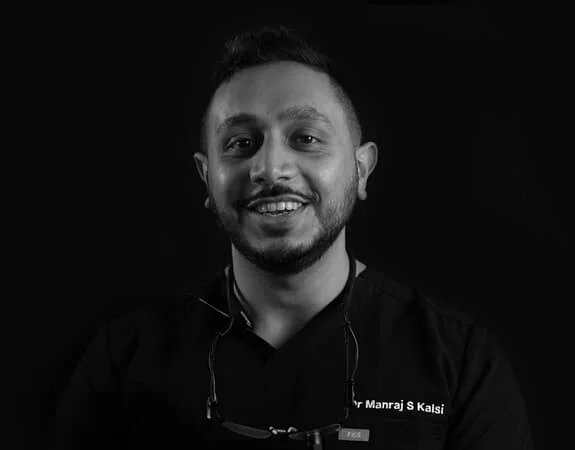
Refer patients for:
Teddington Dental
Sheen Dental
Sunningdale Dental Practice
@Teddington 020 8977 2911
@Sheen 020 8876 5277
@Sunningdale 01344 620526